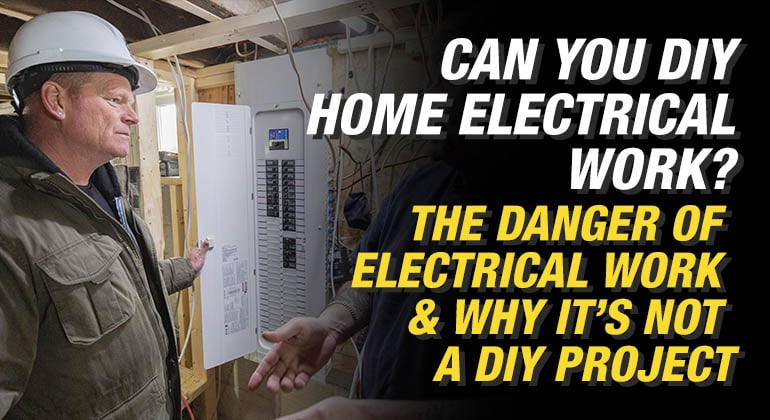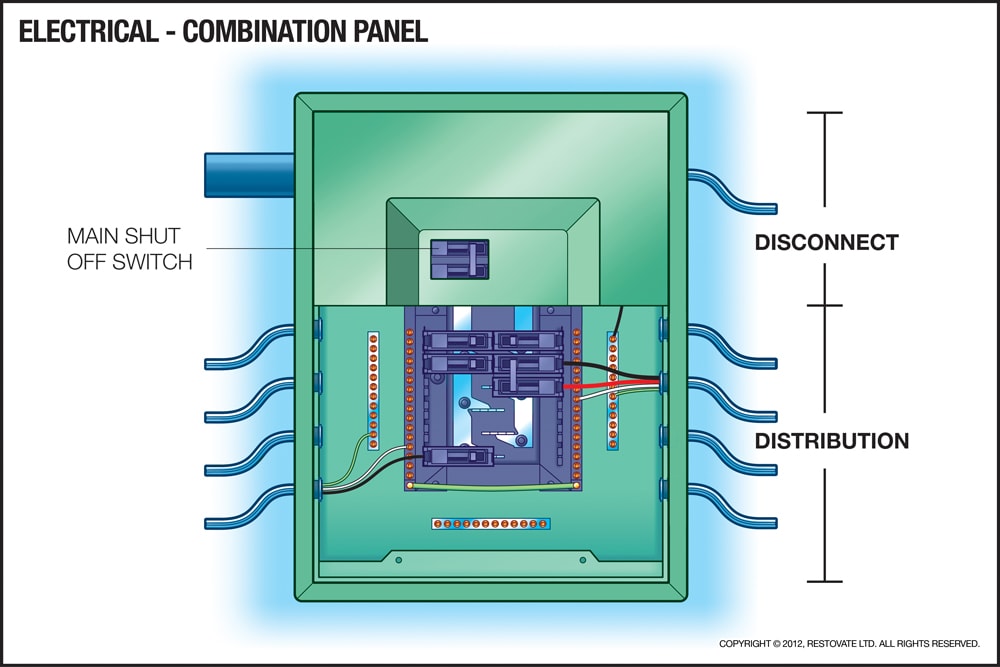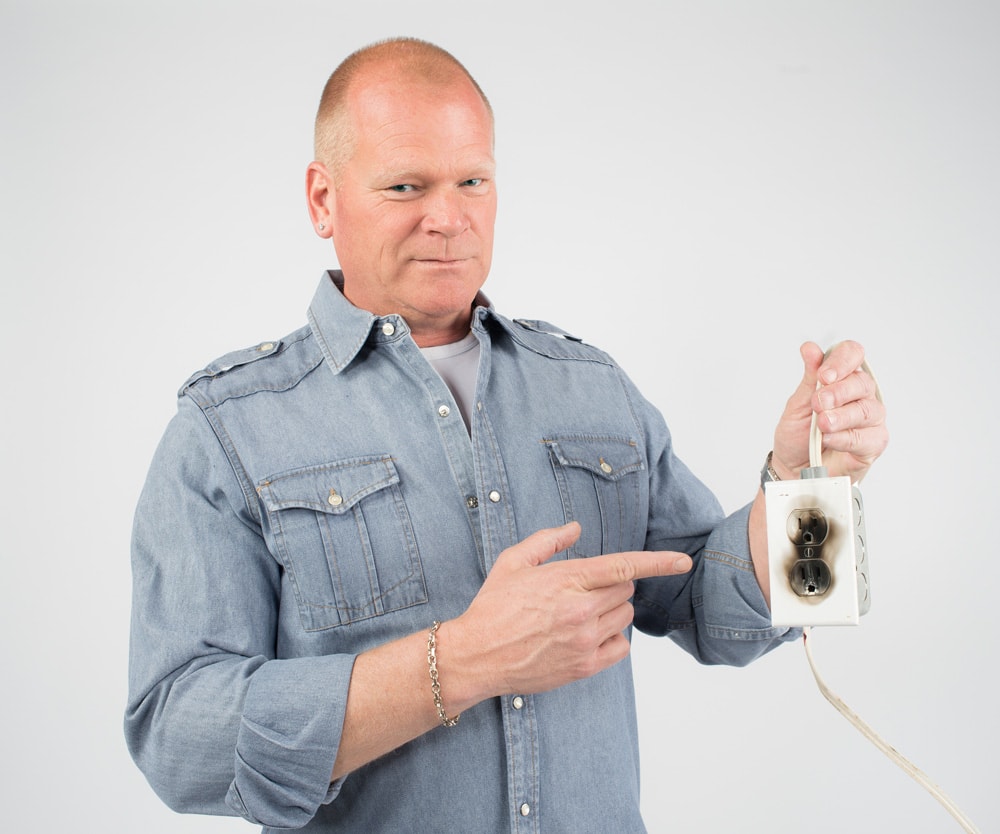HOW TO STAY ORGANIZED IN A SHOWER Keeping your bathroom organized can be a challenge, but with the right strategies and storage solutions, you can transform your shower area into...

THE DANGER OF DIY ELECTRICAL WORK
By Mike Holmes
Mike’s Advice / Home Renovation
Friday, December 16th, 2022 @ 1:03pm
Should You Do Diy Home Electrical Projects For Your Home Repairs
When renovating there are some jobs that are best left to the professionals. While legally, electrical repairs can be done by homeowners I would always recommend you hire a Licensed Electrical Contractor to do the job. Why? Electric work is not something you want to take a risk with, because if DIY electrical work is done incorrectly it can result in electric fires or fatal electric shocks. This can not only damage your property but it can endanger you and your loved ones as well.
The Electrical Safety Authority (ESA), always advises employing a professional since they have the tools, knowledge, and experience needed to complete electrical work in a safe manner. They will also be aware of and follow the most up-to-date national and provincial or territorial codes.
Here’s what you should know when it comes to your home’s electrical and who you should hire.
Can A General Contractor Do Electrical Work?
You wouldn’t think twice about hiring a professional lawyer or mechanic, and you would never trust an uncertified doctor to perform surgery, so why would you trust an unlicensed contractor to do electrical work in your home? Unless they are a Licensed Electrical Contractor, your handyperson or general contractor cannot perform electrical work in your home. Even Certified and Master electricians are not permitted to perform electrical installations on their own.
Who Should You Hire To Do Your Electrical Work?
With a few exceptions, such as HVAC installers, the only professionals legally permitted to perform electrical work in your house are Licensed Electrical Contracting businesses (LECs).
LECs are the only electrical business authorized to offer electrical work to the public in Ontario. It is also the only business that can file permits with the Electrical Safety Authority (ESA) to inspect and ensure the safety of the electrical work completed in the home or business.
Here is a complete guide to hiring a Licensed Electrical Contracting Business in Ontario.
How can you tell if the person you’ve hired is a Licensed Electrical Contractor? Here in Ontario all LECs must have a 7-digit ECRA/ESA licence number that should be displayed on their business cards, advertising, website and company vehicles. You can also verify if you’re electrician is a LEC at findacontractor.esasafe.com. If they aren’t listed there, they are not licensed!

Always hire a LEC to do the electrical work on your home. Frank Cozzolino is a Licensed Electrical Contractor that we trust to do the work on all our projects, why? Because safety first!
What Is The Difference Between Certified Electrician, Master Electrician, and Licensed Electrical Contractor?
Certified Electricians are individuals who work for Licensed Electrical Contractors and are authorised to perform electrical work as their employees. Master Electricians work for LECs to manage the work of Certified Electricians.
Only Licensed Electrical Contractors with a valid ECRA/ESA licence number can be hired to do electrical work in your home.
Both Certified and Master Electricians must be working for a LEC business, which carries insurance and is registered with the Workplace Safety Insurance Board, in order to legally perform electrical installations.
RELATED
What To Look For When Hiring A LEC
If you’re using a general contractor, interior designer or other trade professionals who subcontract the electrical work, confirm they’ve hired a Licensed Electrical Contractor for the electrical work. Also, ensure the Licensed Electrical Contractor will arrange the required electrical notification of work to the ESA.
RELATED
Here are a few things to note when hiring a Licensed Electrical Contracting (LEC) business:
- If you’re in Ontario, all Licensed Electrical Contractors must provide a 7-digit ECRA/ESA licence number that proves they can operate their electrical contracting business in Ontario. This licence number must appear on their vehicles, business cards and all paperwork and can be confirmed using ESA’s Contractor Look-Up Tool
- Written estimates should include ECRA/ESA licence number and ESA permit fees
- Check references
- Confirm that they will file for a notification or permit and get a certificate of acceptance when work is completed.
- Upon completion, licenced electrical contractors should provide the homeowner with a Certificate of Acceptance from ESA for your records.
To find a licensed electrical contractor near you visit: myhome.eaton.com or if you are in Ontario, Canada visit findacontractor.esasafe.com
What Diy Home Electrical Work Is Allowed?
I always recommend hiring a professional for all electrical work.
However, there are smaller jobs every homeowner can do themselves. This includes:
- You can switch out your face covers, for example, something fun for your child’s room
- A handy homeowner, if comfortable could switch out a light fixture, as one as you use the existing wiring – important to disconnect the power before doing any electrical changes
- And of course, changing light bulbs
Apart from these small tasks, you have the legal right to perform your own electrical work if you own the home outright. However, kindly exercise caution and obey the law. Always get a permit from the Electrical Safety Authority (ESA) and have a professional inspect your work. Be safe!
View this post on Instagram
Changing Light Bulbs
While changing a light bulb is an easy task, make sure to check and use the correct wattage bulb. Using a light bulb with too high of wattage can lead to overheating the light bulb. This heat can melt the light socket as well as the wire insulation. Once that happens, you put yourself at risk of arc faults, and sometimes even property fires.
Do You Need An Electrician To Replace Outlets?
For any task requiring electrical wiring of any type, use an expert. If you don’t have the necessary skills or knowledge, you shouldn’t tinker with electrical wiring.
Switches And Sockets
Even though a homeowner can complete this task with knowledge in basic electrical adjustments, changing a light switch to a dimmer switch can be dangerous without the correct knowledge. Therefore, it is always preferable to consult with a LEC.
Receptacle replacement requires a notification if done by the homeowner however switches do not.
Fixing Appliances – Who Should You Hire?
Suppose the warranty covers the appliance repair you bought with your device. Great. If not, you’ll need to call a professional appliance repair specialist to solve your issue and restore your appliance to working order.
What Electrical Work Needs A Certificate Of Inspection?
With very few exceptions, almost all electrical work done in Ontario requires a permit. When the project is over, ESA provides a Certificate of Inspection, which your insurance company may request.
Follow The Electrical Safety Code
No matter where you live, be sure to follow the correct electrical safety code. Hiring a LEC will ensure that your electrical work will be done to code, correctly and safely.
Ontario’s Electrical Safety Code is a provincial law that establishes safety requirements for electrical equipment installation and upkeep. The Electrical Safety Authority and its safety partners work with both the provincial and federal governments to consult on changes to the Ontario Electrical Safety Code, which often also reflect The National Canadian Electrical Code.
File A Notification Of Work With ESA
If you’re in Ontario, there are two ways to file for a notification of work with the ESA:
- Download a form from ESA’s Forms Page. Send the completed form and payment by email to ESA.Cambridge@electricalsafety.on.ca or by fax to 800-667-4278. …
- Contact an ESA representative for more information or to apply for an inspection at 1-877-ESA-SAFE (372-7233).
Find out more information on filing work notifications at www.esasafe.com.
How Often Should An Electrician Look At My Electrical System
The electrical system in your home should be evaluated regularly depending on the age of the house and how many major electrical devices you have. The majority of electricians advise every 3 to 5 years.
I also recommend testing your GFCI outlets at home around once a month. Although it’s not a code requirement it’s a good home maintenance item to check off to make sure your home is safe. You can do this by pressing the test/reset button and making sure the outlet works as intended.
Electrical Fire Warning Signs
If you notice (or smell) any of the following indications, your home may be in danger of an electrical fire:
- Burnt smell that lingers and has no obvious cause
- Several burned or discoloured switches and outlets
- If your home is older than 50 years, your electrical should be inspected and upgraded
Here are a few more electrical warnings to watch for:
Flickering Lights
If lights flicker on and off, sizzles or crackles it usually means that the switch contacts are getting bad and you should replace the switch. It could also mean the wire connections are loose in the switch or the circuit breaker panel or in the pass-through wire connection in the wall or ceiling box.
Recessed lights can have similar issues and can overheat. If any of these occur or if you suspect any issues with your lights contact a LEC.
HOW TO FIX THIS: Talk to a LEC, but there are a few things you can try to fix this. Tightening the bulb to ensure it’s securely in the fixture may be all you need to do, as turning the light on and off can loosen the contact point. Also, check the plug to ensure it’s secure in the outlet. You may also have a LED bulb in a dimmable light fixture or the reverse. Also, a simple bulb replacement may do the trick as filaments wear out, or you may be using the incorrect bulb for the fixture.
Circuit Breaker Repeatedly Trips
There are three reasons a circuit breaker trips:
- An overloaded circuit
- A short circuit
- A ground fault
The main reason why circuit breakers trip is an overloaded circuit. It happens when a circuit receives more electrical current than it is designed to handle. This typically occurs when you connect too many electrical devices to one outlet or when you connect a large device (like a microwave) to a circuit that isn’t designed for it.
Circuit overloads are hazardous. They might make your home’s cables overheat, which might subsequently start a fire.
HOW TO FIX THIS: Hire a LEC to change the circuit where some of your electric appliances are located. They may also need to run a new circuit if it is absolutely important to have all the appliances in one location.

Depending on the type of branch circuit breaker, breakers trip to a safe position to protect the home and homeowners from arc faults, ground faults, or thermal overload.
Short Circuits
A short circuit is when electricity is allowed to travel over an unintended path. This occurs when the hot wire (black) hits another wire or when there is a break in a hot wire. The challenge is that the electrical item you have connected to the wiring in your home could have a short or the wiring of your home itself may contain the short.
HOW TO FIX THIS: Once the short circuit within the wiring system is located, your electrician will replace the old, damaged wire with new wire and conduct the necessary tests to ensure the connection is working correctly. Only a LEC should address a short circuit because it is a serious issue. If you think your home has a short, call a qualified electrician.
Ground Fault
A ground fault is actually a kind of short circuit. It typically happens when the hot wire makes contact with the bond wire, which is typically bare copper, or the metal box’s side (since the box is also bonded). An object that shouldn’t be in an electrical outlet can potentially result in a ground fault.
GFCI is integrated into the outlet and monitors the appliance when plugged into the outlet. The GFCI detects the difference in current from what leaves to what returns. and shuts off the electricity to the outlet, protecting you from shock if, for instance, you drop your hairdryer into a running sink. This is also why a GFCI may trip with a long extension cord as the voltage drop can reach the threshold of the device

A ground fault circuit interrupter (GFCI) can help prevent electrocution.
HOW TO FIX THIS: If your GFCI trips press the reset button. If the reset button trips right away after resetting, something on that circuit is probably the cause of the trip. Try the reset button after unplugging all the appliances that are connected to that circuit. If the reset button does not reset, either the GCFI or the outlet is not powered. This can also be caused by a faulty GFCI outlet or one that has reached its end of life
You may also check if the breaker (at your main electrical box) has to be reset if it has tripped. If not of these troubleshooting methods work, contact a licensed electrician if you think your home’s wiring has a ground fault because this is a very dangerous issue.
RELATED:
What Are Five Electrical Safety Tips You Should Know For Your Home
- Familiarize yourself with your electrical, know where your breaker is and how to use it
- Only use extension cords for temporary circumstances, if you require more outlets and your electrical needs change, consult with a licensed electrical contracting business
- Don’t ignore all the warning signs mentioned in this blog
- Be smart and avoid doing electrical work that should be completed by a licensed professional
- Ensure appliances and wiring do not come in contact with water
RELATED:
Tips To Protect Against Electrical Fires
Electrical fires can seriously harm your house and endanger the safety of you and your family. The good news is that electrical fires can be avoided, just like other home fires.

The longer you wait to get it fixed, the greater the risk for your home to start an electrical fire.
Here are some home safety tips to protect your home against electrical fires:
- Keep heat-generating appliances unplugged, when not in use
- Extension cables should only be used as short-term fixes
- Never cut off the third prong on a power cord
- Upgrade your electrical system, if you have Knob-and-tube wiring, aluminum wiring, and 60-amp electrical systems
- Do not use devices with damaged power cords
Read more about protecting your homes from electrical fires.
Pay attention to your small appliances:
- Are they overheating
- Does your power cord feel hot after use
- Electrical spark each time you plug in a device
- You feel a shock each time you plug in a device
- Your breaker frequently trips
If you experience any of these please contact a Licenced Electrical Contracting Business.
Despite our best efforts electrical and fires happen so always have a Class C Fire Extinguisher nearby. Also, make sure you have the proper home insurance coverage to keep you safe.
The majority of us take electricity for granted, yet it is a crucial component of modern life, even if you believe you can perform a straightforward electrical activity. Think again. Working with electricity is risky, and if you are not properly trained, you put yourself in danger of getting hurt by electrical shock or death from electrocution. For all of your electrical needs, act wisely and contact a licenced electrical contracting business.
READ NEXT:








